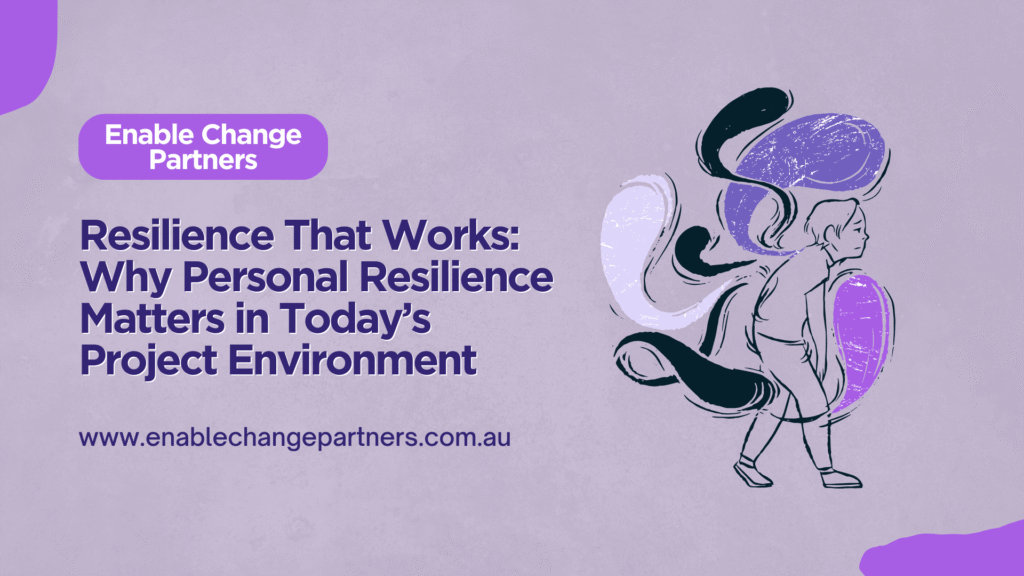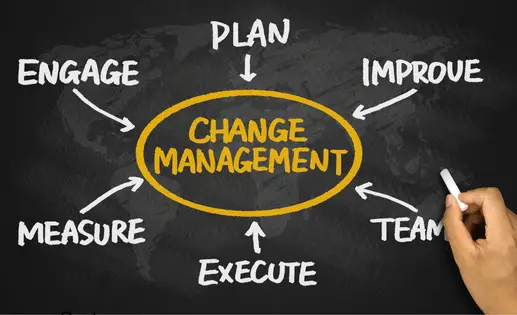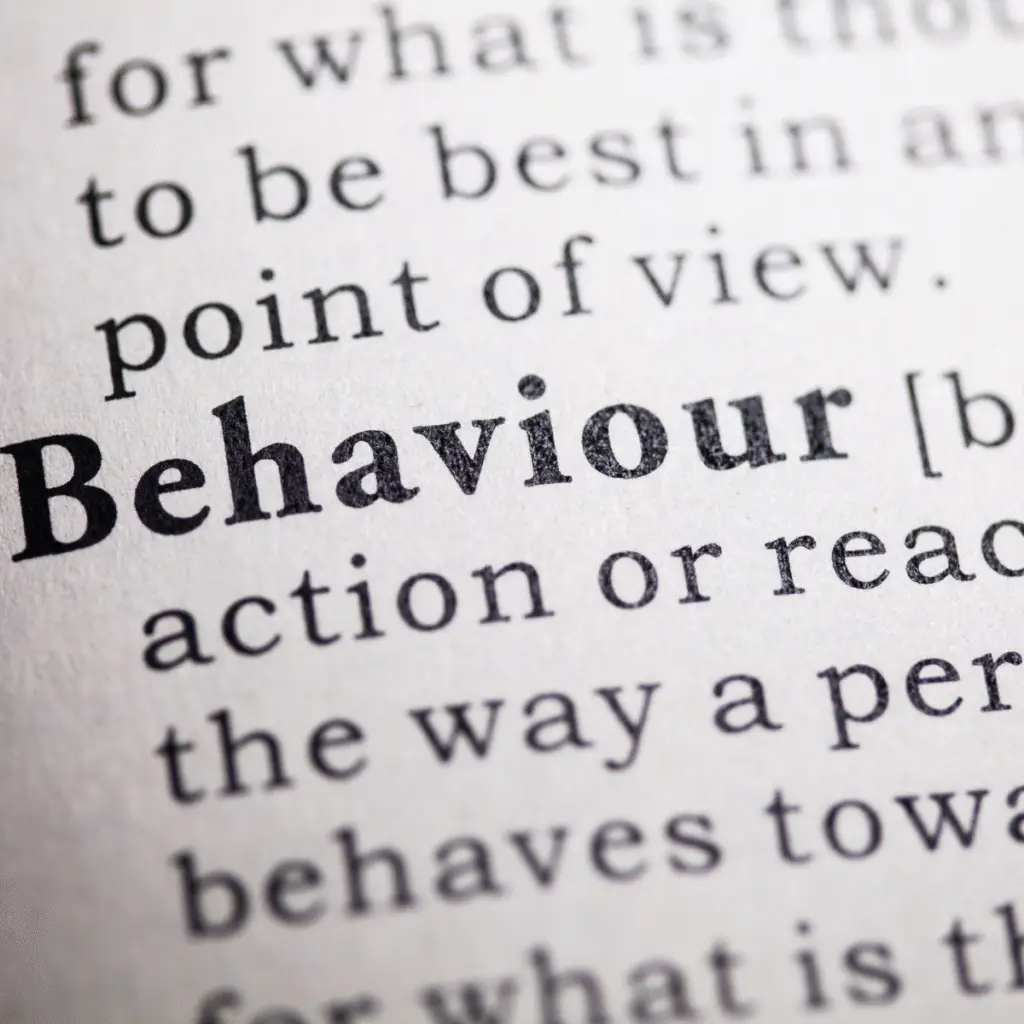What 2025 Taught Us About Transformation and How Leaders Can Move Forward With Confidence in 2026

A practical end-of-year guide by Enable Change Partners
2025 reshaped transformation across sectors. Ambition was high, but momentum proved fragile. Clear outcomes, steady leadership alignment and a strong people experience separated those who advanced from those who stalled.
Ten lessons stood out: sharpen outcomes, reinforce leadership unity, design with people in mind, build real capability, manage overload, strengthen data foundations, ground technology in user insight, simplify governance, elevate middle managers and prioritise learning through iteration.
As 2026 approaches, the organisations that will lead are those that streamline effort, stay connected to their teams and build capability that grows over time. Enable Change Partners will continue supporting leaders to navigate complexity with confidence and deliver meaningful, lasting results.
Resilience That Works: Why Personal Resilience Matters in Today’s Project Environment

This week I facilitated a resilience session for a cross collaborative program that brought internal teams and vendor partners together. For a rare moment, people stepped out of project mode and focused on something that is often overlooked in delivery environments: their own personal resilience. As soon as the space opened, the room shifted. People exhaled. They spoke honestly. They recognised how unpredictable project work can be and how much their ability to adapt and recover influences how they show up for others.
Resilience is not an individual burden or a private responsibility. It is a professional capability that affects decision quality, communication, wellbeing and team cohesion. This is the intention behind our Resilience That Works workshop. It gives teams practical tools that help them understand their stress patterns, regulate effectively and build simple habits that support them during demanding periods. When resilience grows, project delivery becomes clearer, calmer and more sustainable.
This session was a reminder of an important truth: resilience strengthens through small and intentional actions. When leaders create space for these actions, people respond with more clarity, steadiness and connection. These are the qualities that complex project environments rely on most.
AI Is Transforming Business, But Without Change Leadership, We Risk Losing the One Thing AI Cannot Replace

Artificial intelligence is transforming the workplace faster than anyone expected. Speed, precision and efficiency have never been easier to achieve. Yet beneath the excitement sits a challenge many leaders are overlooking: as AI becomes more capable, people risk relying on it before they’ve built the skills that set professionals apart.
AI can produce polished work in seconds, but it cannot develop judgement, influence, confidence or the insight that comes from real experience. When people skip straight to refined output, they also skip the learning that shapes capability. The result is a growing gap between how skilled someone appears and how skilled they actually are.
The organisations that succeed in this new landscape recognise a simple truth: AI should lift people, not replace their growth. Human centred leadership ensures teams stay intentional, think for themselves and use AI in ways that strengthen, not dilute, capability. This is where real advantage is created.
Stop the Change Theatre. Build Capacity Instead.

Change isn’t an occasional project anymore; it’s a constant reality. HBR’s Leading Through Continuous Change (2025) shows that the average employee is now involved in ten separate initiatives at once, compared to just two in 2016. What looks like resistance is often something else entirely: overload. Most organisations don’t struggle with resistance; they struggle with capacity.
At Enable Change Partners, we’ve learned that transformation succeeds when leaders design for capacity, not just momentum. That means mapping where teams are stretched, sequencing initiatives around real energy, and building recovery time into delivery.
When people have space to absorb change, they stop pushing back and start engaging. The key isn’t to make change happen faster but to make it possible for people to keep going.
Designing for Good Friction: Why Slowing Down Can Move You Forward

In the race for transformation, many organisations equate progress with speed. Yet the constant push to move faster can quietly erode safety, trust, and sound judgment. As Bob Sutton and Huggy Rao argue in The Friction Project, not all friction is bad. The right kind creates space for reflection, clarity, and better decisions.
At Enable Change Partners, we see that friction, when designed with purpose, protects people and strengthens outcomes. Good friction builds guardrails that support flow, while bad friction adds noise and delay. The challenge for leaders is knowing the difference.
Real transformation happens when leaders design friction intentionally, slowing down the right moments so their teams can move forward with focus and confidence.
The Power of Partnership: Building Strong Relationships in Technology Projects

Behind every successful technology project is one defining factor: strong relationships.
Tools, frameworks, and budgets matter, but the real difference comes from how people connect, collaborate, and trust one another.
When Project, Change, Test, and Business teams work together with empathy and respect, they deliver more than a functioning system. They create solutions that people understand, believe in, and are ready to use. Transformation succeeds when relationships are as strong as the technology itself.
Beyond the Dashboard: Why Change Success Can’t Be Measured in Clicks

It’s easy to celebrate numbers that look good: 100% trained, 100% logged in, a “smooth” launch. But numbers don’t tell you if the change is truly working. Real progress shows up in how people behave, not just what the dashboard displays.
At Enable Change Partners, we look beyond completion rates to what really matters: confidence, capability, and connection. Because meaningful change doesn’t live in reports. It lives in people.
What is Change Management?

Change management is about helping people adjust when the way they work shifts, whether through new systems, processes, or rules. Too often, organisations focus on technology and procedures while overlooking the people who need to adapt. When employees are not supported, resistance grows, morale drops, and projects stall. At Enable Change Partners, we focus on every dimension of change: social, behavioural, emotional, physical, and technical. By training staff, coaching leaders, and providing ongoing support, we help organisations of any size embed new ways of working smoothly. The result is faster adoption, reduced resistance, and employees who feel engaged, valued, and capable of thriving in the future.
Beyond Checklists: Measuring Behaviour in Change

Measuring change goes beyond counting training attendance, survey responses, or e-learning completions. These numbers show participation, not whether people are working differently. Real insight comes from behavioural measurements, the observable actions that signal change is taking hold. Whether it is managers approving timesheets in a new system, employees creating guides to help colleagues, or teams starting meetings with new priorities, these small shifts reveal adoption in action. By defining success in behavioural terms, creating safe ways to observe, and using those insights to guide conversations, organisations gain a clearer view of progress. Behavioural measures uncover whether new ways of working are embedded, highlight early warning signs, and demonstrate the real value of change.
Balancing Speed with Stability in Change

When disruption becomes the norm, speed feels like the only answer. New technologies, shifting markets, and tighter budgets push leaders to deliver results almost overnight.
But moving too fast without the right structures comes at a cost. Engagement drops, accountability blurs, communication falters, and resistance builds. What starts as urgency can quickly stall into rework and frustration.
That is why guardrails matter. At Enable Change Partners, we see them not as brakes, but as enablers. Experienced Change Managers provide these safeguards. They help leaders set the right pace, reduce risks, and keep people engaged so transformation delivers without breaking the business.
At ECP, we are often called the guardians of momentum. We help organisations move at the pace they need, while keeping change human, resilient, and sustainable.
